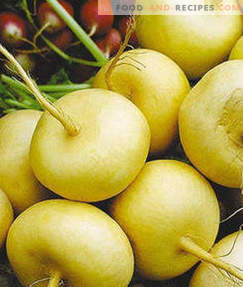
Turnip is a vegetable crop, one of the most famous representatives of the genus of the Cruciferous family. The homeland of this plant is Western Asia: it was proved that it was grown on the territory of the Arabian Peninsula more than 4 thousand years ago.
In ancient Egypt and Greece, only representatives of the lower classes ate their turnips: poor farmers and slaves. At the same time, in ancient Rome, dishes from it were popular among peasants and nobles. In Russia, turnips for a long time remained the main vegetable crop. Only in the XVIII century, the competition to this culture was able to make potatoes imported from Holland.
Turnip is a perennial plant. With successful sowing in the first year, a rosette of ovoid pinnacled green leaves on long petioles and a fleshy rounded root grows from seed. In the second year, a long, leaf-covered stem with yellow flowers collected in racemes appears from the root. The fruit of the plant is a short knotted pod with spherical seeds of brownish-red color.
Turnip is one of the most important components of Russian traditional cuisine. Root crops of this culture have long been used to make malt soup, repnits, baked, boiled, stewed, and served as a hearty garnish to meat dishes. Raw turnips are often included in the composition of vitamin salads, and its juice is an indispensable component of healthy vegetable cocktails. Root vegetables are stuffed with vegetables, mushrooms and meat, pickled and dried, cooked with stews and casseroles. Along with this, turnips are actively used as a means of traditional medicine, allowing to effectively cope with many different pathologies.
Nutritional value of turnip and vitamins in its composition
Turnip is a vegetable crop with high nutritional value. The composition of the roots of this plant contains proteins, indigestible fibers, carbohydrates, vitamins and other substances useful for the body. An interesting fact is that turnip is a rich source of ascorbic acid: 100 g of the product contains up to 23% of the daily requirement of this compound.
Nutritional value 100 g of turnip:
- 1, 481 g of proteins;
- 6, 184 g of carbohydrates;
- 1,817 g of indigestible fibers;
- 0, 263 g of starch;
- 0, 099 g of fat;
- 0, 083 g of organic acids;
- 5, 671 g of mono-, disaccharides;
- 0, 667 g of ash;
- 89, 468 g of water.
Vitamins per 100 g of turnip:
- 0, 089 mg of beta-carotene;
- 0, 039 mg of riboflavin;
- 1, 089 mg of the niacin equivalent;
- 0.091 mg of alpha-tocopherol (E);
- 0, 769 mg of vitamin PP;
- 19, 894 mg of ascorbic acid;
- 16, 868 mcg of retinol equivalent (A);
- 0, 046 mg of vitamin B1.
Energy value of turnip
Turnip is a nourishing diet product with low energy value. This property allows you to include dishes prepared on its basis in the diet menu for people suffering from obesity.
- Caloric value of 100 g of turnip in raw form - 31, 73 kcal.
- Caloric content of a root crop of the average size (200 g) - 63, 46 kcal.
- Caloric value of boiled turnip - 32, 17 kcal.
- Calorie stewed turnip - 29, 84 kcal.
- Caloric content of steamed turnip - 31, 04 kcal.
Trace elements and macro elements in the composition of turnips
Turnip is a real storehouse of potassium, iron, calcium, phosphorus and other useful elements. Regular (at least once in 4-6 days) consumption of root crops contributes to the effective and rapid replenishment of the reserves of these essential substances in the human body.
Macroelements in every 100 g of turnip:
- 237, 463 mg of potassium (K);
- 48, 164 mg of calcium (Ca);
- 33, 178 mg of phosphorus (P);
- 16, 912 mg of sodium (Na);
- 16, 861 mg of magnesium (Mg).
Trace elements in every 100 g of turnip:
- 0, 874 mg of Fe (iron).
Useful Properties of Turnip
- Turnip is a rich source of calcium. That is why regular consumption of dishes prepared on its basis is an effective preventive measure, which allows to prevent the occurrence of rickets in children, diseases of the blood and bones in adults.
- Warm broth and boiled turnip juice have anti-inflammatory, analgesic and antiseptic properties. Therefore, traditional healers prescribe to use them for rinsing the mouth with toothache, stomatitis, gingivitis and other dental diseases. Substances contained in these drinks have a beneficial effect on the state of the enamel layer of teeth. In addition, a warm broth or turnip juice, sweetened with honey, taken orally with a strong unproductive cough, colds, laryngitis, proceeding in acute form, as well as hoarseness.
- The roots of the plant are a rich storehouse of vitamins and useful elements. Therefore, regular consumption of them in food is an effective method of preventing vitamin deficiency.
- It has been established that substances present in turnips help to normalize heart rhythm and prevent the development of heart diseases.
- Turnip contains a lot of fiber and other substances that enhance the motility of the digestive tract, stimulate the production of digestive enzymes and significantly accelerate metabolic processes. Thus, regular consumption of dishes prepared from it allows to normalize the work of the gastrointestinal tract, improve the absorption of food and get rid of obesity.
- Turnip juice has a slight laxative and diuretic effect. Regular consumption of this drink benefits people suffering from constipation or diseases of the urinary system.
- Boiled turnip, pounded into a thick gruel, is useful to apply to the affected places for gout. In order to alleviate the unpleasant symptoms of this disease, you can use the ointment prepared from the resulting puree and goose fat. In addition, a great remedy for gouty pain is a decoction of turnips: it is used to prepare daily warm baths.
- Turnips contain a rather rare component, glucoraphanin. When chewing food, this substance under the action of enzymes is transformed into sulforaphane - a compound with antitumor and antibacterial properties. Thus, regular consumption of turnips can reduce the risk of some infectious diseases and certain forms of cancer. Studies have also shown that glucoraphanin has the ability to block enzymes that have a destructive effect on cartilage tissue.
- Daily consumption of raw turnip normalizes the work of the visual apparatus, improves the condition of the skin and its appendages (nail plates, hair), and normalizes the microflora of the urinary tract in thrush.
- Organic compounds of plant origin, contained in turnips, can have a mild sedative effect. For this reason, nutritionists advise to include meals prepared on its basis in the diet for insomnia, increased irritability and nervous excitability.
Contraindications to turnip consumption
- The main contraindication to the consumption of turnips is the presence of diseases of the digestive tract that occur in an acute form.
- According to nutritionists, consumption of the root crops of this plant (in any form) can harm people suffering from chronic kidney and liver diseases.
- It is not recommended to include turnips in the diet of persons suffering from chronic cholecystitis or hepatitis.
- Turnip is contraindicated in people who have been diagnosed with CNS disease.
- Young mothers who are breastfeeding a baby should be careful to inject the roots of this plant into the diet. In case of unfavorable circumstances, the substances in their composition can provoke severe pain in the baby, diarrhea, constipation, or severe allergic reactions.
- The absolute contraindication to the consumption of turnips and dishes based on it is individual intolerance.























